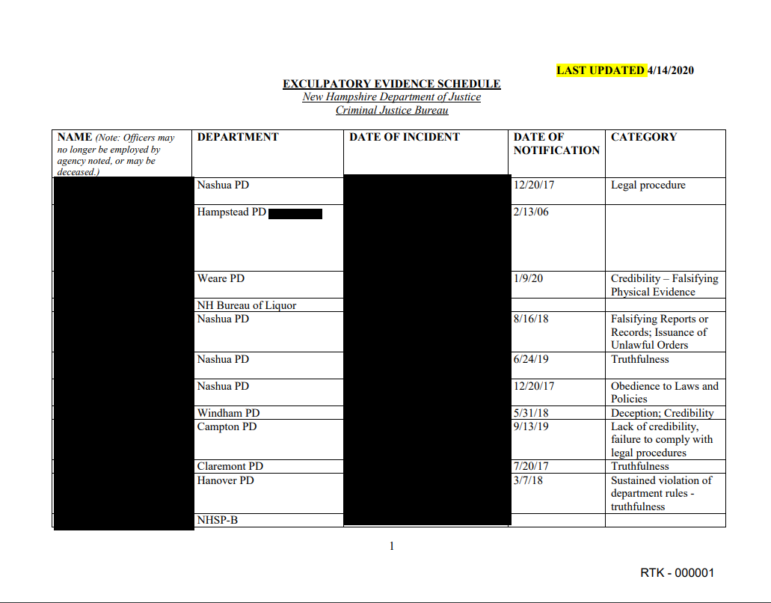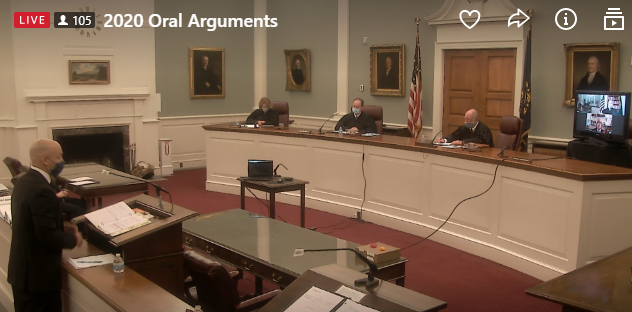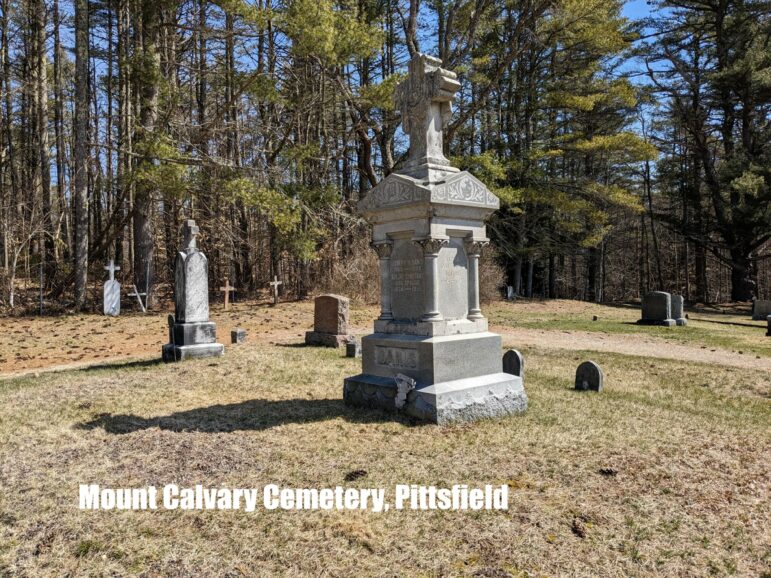By NANCY WEST, InDepthNH.org
CONCORD – Solicitor General Dan Will argued to the state Supreme Court Wednesday that the Laurie List of untrustworthy law enforcement officers should remain secret because it is “imperfect” and was never intended to be made public.
Will argued Attorney General Gordon MacDonald’s appeal of Superior Court Judge Charles Temple’s ruling in April 2019 that ruled the Laurie List – now called the Exculpatory Evidence Schedule – is a public record that should be released without redactions.
Attorneys for news outlets that won the public records lawsuit to release the unredacted list with an estimated 280 names at the Superior Court level, argued Wednesday that citizens cannot only be trusted with the incomplete information, but must have it so they can hold government accountable and make sure the system is working.
Will told the justices that the list is simply a device for prosecutors to reconcile their obligation to disclose exculpatory evidence in police personnel files to criminal defendants as guaranteed by the state and federal constitutions. Exculpatory means it is evidence favorable to the defendant.
“It’s an imperfect list your honors,” Will said. “It was never designed to be some sort of public record or document.”
Will said the list over the years lacked uniformity relative to which officers get on or off since its inception in 2004.
“The list is likely under-inclusive and over-inclusive,” Will said.
See copy of the most recent list here: https://drive.google.com/file/d/1PumiMcSlQCBqCm9sKkBYNJFUu10GWE8-/view?ts=5f371bab
The court live streamed the closed hearing from the state Supreme Court in Concord because of COVID-9.
Although the protocols for maintaining the list were updated in the last three years to make sure officers have due process in getting on and off the list, there is still no mechanism to deal with the names of deceased officers, Will said.
Senior Associate Justice Gary E. Hicks said: “I was surprised at how long the list is. How accurate is that?”
Will said: “I’m not sure anybody really knows,” adding that creates significant issues in whether to make the list public.
Hicks said: “How do we know that unless we open it up?”
Will said: “I think we know that because of the nature of the list itself.”
Will said Gov. Chris Sununu’s Commission on Law Enforcement Accountability, Transparency and Community addresses the issue of making police misconduct public, but it would also require changes in the law.
“It has its own website,” Will said of the commission, but is not part of the state Supreme Court appeal.
Hicks said presumably if this case were remanded to Judge Temple or whoever sits could adopt the police panel’s recommendation.
Justice Anna Barbara Hantz Marconi said: “There is very little information other than the names of the officer on this. Correct?”
Will said that was another significant reason to not release the list. The names are currently redacted.
Marconi said: “If this thing becomes public there could be a reticence to actually put people on the list.”
Will agreed, saying as it stands prosecutors and police chiefs can err on the side of caution in placing officers on the list.
ACLU-NH Legal Director Gilles Bissonnette represented the news outlets in the case except the Union Leader, which was represented by attorney Gregory Sullivan.
Bissonnette said there are many important pieces of information on the list that the public is entitled to know, including the unredacted names. He mentioned a few details of sustained discipline such as falsifying reports, deception, credibility, deliberately lying during an investigation, cover-up.
“The list goes on and on,” Bissonnette said.
Marconi said: “Isn’t credibility a somewhat broad issue statement? A lot of things could weigh on a witness’s credibility that aren’t criminal or even deception.”
Bissonnette didn’t disagree with her.
“The point I’m trying to make here is this is a sustained finding,” Bissonnette said, adding a police chief had already made a determination that the police officer had done something that impacts that officer’s credibility and trustworthiness.
“That officer has had the ability to contest that finding to the police chief” and had recourse to get off the list including going to court or seeking removal from the list to the Attorney General’s Office.
Bissonnette said the public should know whether the officers they are paying have credibility issues and which of the officers in individual departments are on the list, not just the number. It’s important that criminal defendants and defense attorneys can also know who’s on the list to make sure they get all of their rights to a fair trial.

Not knowing is also bad for public confidence in police and the criminal justice system, Bissonnette said.
“The system we currently have in criminal cases is defendants just have to trust that this is working well, that they are getting everything they are supposed to get with no way of verifying it,” Bissonnette said.
Bissonnette said it doesn’t matter if the list is imperfect. It should be released because the government has to relay complicated information to people all the time.
The response should be more transparency, not secrecy, he said.
Marconi asked if there should be a public list kept of deficient teachers as well.
Gilles said it is a whole different matter for police officers with respect to the criminal justice system.
Representing the Union Leader, attorney Gregory Sullivan said the state constitution and the right-to-know law control the case.
“I think what’s been lost in the arguments somewhat and in briefing, etc. is that we are talking about a list maintained by the Department of Justice, the Attorney General’s Office. We are not talking about police personnel files; we are not talking about police personnel files,” Sullivan said.
Marconi asked if the list wasn’t in fact information from police personnel files.
“And other sources. Yes, presumably,” Sullivan said. “We don’t really know that. That’s why more transparency not more concealment is the answer to all of these questions.”
Hicks also asked Solicitor General Will if the Attorney General’s Office still maintains that the list falls under categorical exemptions of the state’s right-to-know law given the court’s recent rulings that overturned the so-called Fenniman decision. Will said no.
The two other public records cases decided since MacDonald appealed Judge Temple’s Laurie List ruling were widely seen as a victory for the public’s right to know about misconduct by public officials that has previously been deemed confidential.
The two cases were filed by the New Hampshire Union Leader and Seacoast Newspapers after they were denied access to documents involving alleged police misconduct in separate public records cases under the internal personnel practices exemption of RSA 91a, the state’s right-to-know law.
On Wednesday, retired Superior Court Justices Gillian Abramson and Kenneth Brown sat in via video with Senior Associate Justice Hicks and Justices Marconi and Patrick E. Donovan. Justice James Bassett disqualified himself and there has been no replacement for retired Chief Justice Robert Lynn.
The public records case was filed by the New Hampshire Center for Public Interest Journalism, Telegraph of Nashua, Union Leader Corporation, Newspapers of New England, Inc., through its New Hampshire properties, Seacoast Newspapers, Inc., Keene Publishing Corporation, and The American Civil Liberties Union of New Hampshire





